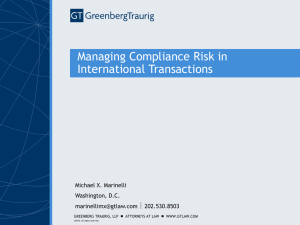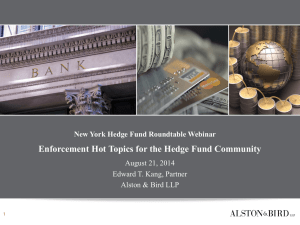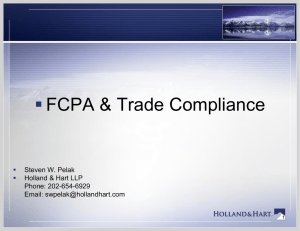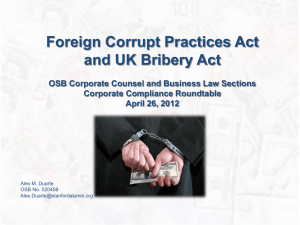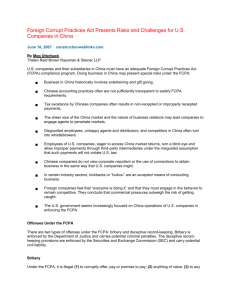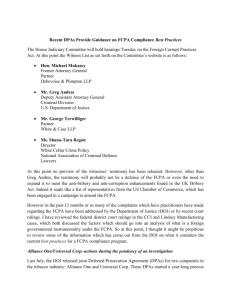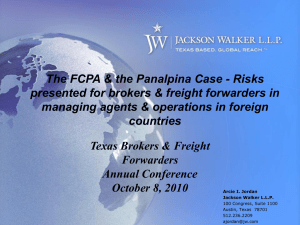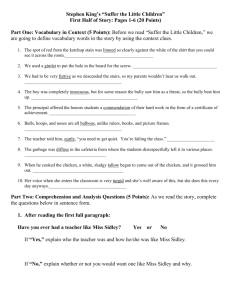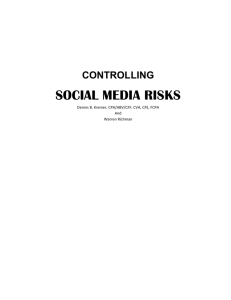anti-corruption - Sidley Austin LLP
advertisement
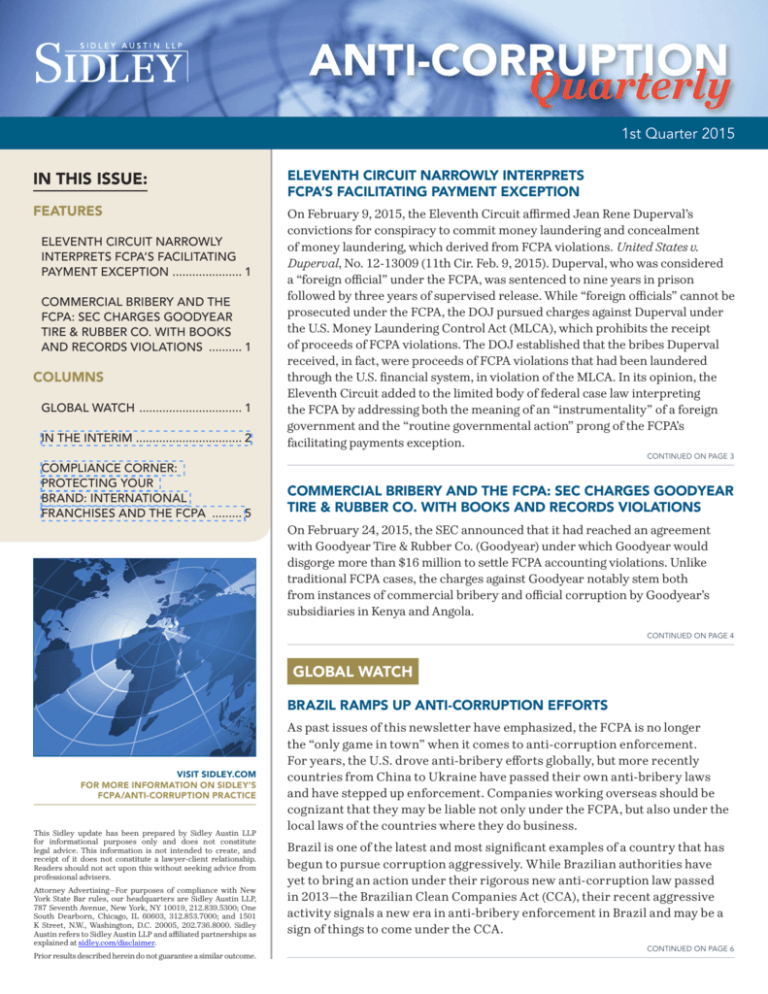
ANTI-CORRUPTION Quarterly 1st Quarter 2015 IN THIS ISSUE: ELEVENTH CIRCUIT NARROWLY INTERPRETS FCPA’S FACILITATING PAYMENT EXCEPTION FEATURES On February 9, 2015, the Eleventh Circuit affirmed Jean Rene Duperval’s convictions for conspiracy to commit money laundering and concealment of money laundering, which derived from FCPA violations. United States v. Duperval, No. 12-13009 (11th Cir. Feb. 9, 2015). Duperval, who was considered a “foreign official” under the FCPA, was sentenced to nine years in prison followed by three years of supervised release. While “foreign officials” cannot be prosecuted under the FCPA, the DOJ pursued charges against Duperval under the U.S. Money Laundering Control Act (MLCA), which prohibits the receipt of proceeds of FCPA violations. The DOJ established that the bribes Duperval received, in fact, were proceeds of FCPA violations that had been laundered through the U.S. financial system, in violation of the MLCA. In its opinion, the Eleventh Circuit added to the limited body of federal case law interpreting the FCPA by addressing both the meaning of an “instrumentality” of a foreign government and the “routine governmental action” prong of the FCPA’s facilitating payments exception. ELEVENTH CIRCUIT NARROWLY INTERPRETS FCPA’S FACILITATING PAYMENT EXCEPTION ...................... 1 COMMERCIAL BRIBERY AND THE FCPA: SEC CHARGES GOODYEAR TIRE & RUBBER CO. WITH BOOKS AND RECORDS VIOLATIONS ........... 1 COLUMNS GLOBAL WATCH ................................ 1 IN THE INTERIM ................................ 2 CONTINUED ON PAGE 3 COMPLIANCE CORNER: PROTECTING YOUR BRAND: INTERNATIONAL FRANCHISES AND THE FCPA .......... 5 COMMERCIAL BRIBERY AND THE FCPA: SEC CHARGES GOODYEAR TIRE & RUBBER CO. WITH BOOKS AND RECORDS VIOLATIONS On February 24, 2015, the SEC announced that it had reached an agreement with Goodyear Tire & Rubber Co. (Goodyear) under which Goodyear would disgorge more than $16 million to settle FCPA accounting violations. Unlike traditional FCPA cases, the charges against Goodyear notably stem both from instances of commercial bribery and official corruption by Goodyear’s subsidiaries in Kenya and Angola. CONTINUED ON PAGE 4 GLOBAL WATCH BRAZIL RAMPS UP ANTI-CORRUPTION EFFORTS VISIT SIDLEY.COM FOR MORE INFORMATION ON SIDLEY’S FCPA/ANTI-CORRUPTION PRACTICE This Sidley update has been prepared by Sidley Austin LLP for informational purposes only and does not constitute legal advice. This information is not intended to create, and receipt of it does not constitute a lawyer-client relationship. Readers should not act upon this without seeking advice from professional advisers. Attorney Advertising—For purposes of compliance with New York State Bar rules, our headquarters are Sidley Austin LLP, 787 Seventh Avenue, New York, NY 10019, 212.839.5300; One South Dearborn, Chicago, IL 60603, 312.853.7000; and 1501 K Street, N.W., Washington, D.C. 20005, 202.736.8000. Sidley Austin refers to Sidley Austin LLP and affiliated partnerships as explained at sidley.com/disclaimer. Prior results described herein do not guarantee a similar outcome. As past issues of this newsletter have emphasized, the FCPA is no longer the “only game in town” when it comes to anti-corruption enforcement. For years, the U.S. drove anti-bribery efforts globally, but more recently countries from China to Ukraine have passed their own anti-bribery laws and have stepped up enforcement. Companies working overseas should be cognizant that they may be liable not only under the FCPA, but also under the local laws of the countries where they do business. Brazil is one of the latest and most significant examples of a country that has begun to pursue corruption aggressively. While Brazilian authorities have yet to bring an action under their rigorous new anti-corruption law passed in 2013—the Brazilian Clean Companies Act (CCA), their recent aggressive activity signals a new era in anti-bribery enforcement in Brazil and may be a sign of things to come under the CCA. CONTINUED ON PAGE 6 ANTI-CORRUPTION Quarterly IN THE INTERIM 1/5/2015 The Israel Securities Authority arrested a senior vice president, Yacov (Yasha) Hain, of the state-owned Israel Electric Corporation (IEC). Five others were detained. Hain stands accused of taking hundreds of thousands of dollars in bribes related to Siemens’ admission that it paid bribes from 1999 to 2001 to win an IEC contract worth $786 million. 1/6/2015 Dmitrij Harder, the former owner and president of the Chestnut Consulting Group, Inc., was indicted by a Pennsylvania grand jury for allegedly bribing a senior official at the European Bank for Reconstruction and Development. 1/22/2015 PBSJ Corp., a Florida-based engineering and construction firm, agreed to pay $3.4 million for violating the FCPA by paying bribes to win Qatari government contracts. PBSJ agreed to disgorge $2.8 million, pay $140,000 in interest, and pay a penalty of $375,000. The SEC also charged Walid Hatoum, PBSJ’s former international marketing director, with FCPA violations. Without admitting or denying the SEC’s allegations, Hatoum agreed to pay a penalty of $50,000 to resolve the case. 1/27/2015 BNY Mellon Corp. disclosed in its 10-K filing that it had received a Wells Notice and an additional subpoena from the SEC. The Wells Notice recommended enforcement action for alleged FCPA violations regarding BNY Mellon’s dealings with sovereign wealth funds. The SEC’s investigation focuses on whether the bank awarded internships and other employment opportunities to employees and/or relatives of sovereign wealth fund officials and/or other government-related entities. 2/2/2015 21st Century Fox Inc. and News Corp. disclosed that they had each received a declination letter from the DOJ for allegedly hacking voicemails and making payments to public officials in the UK. 2/6/2015 President Obama issued a National Security Strategy (NSS). A key goal of the NSS is for the United States to continue leading the global fight against graft, which is a direct threat to peace, the rule of law, human rights, democratic institutions and public health. The NSS likely signals a renewed commitment by 2/19/2015 SNC-Lavalin and two subsidiaries have been charged with criminal corruption and fraud in Canada. The charges arise from the alleged activities of former employees approximately three years ago in Libya. SNC-Lavalin has stated that it firmly considers that the charges against it are not warranted. 2/24/2015 Goodyear Tire & Rubber Co. agreed to pay $16.2 million to settle charges brought by the SEC alleging violations of the books and records and internal control provisions of the FCPA, and that its subsidiaries in Kenya and Angola had paid bribes to increase tire sales. CONTINUED ON PAGE 3 Corporate FCPA-Related Penalties* FCPA-Related Cases* 113 93 DOJ the administration to use the FCPA to prosecute violators. 1885.12 1569.71 (in U.S. millions) SEC 803.0 49 731.1 644.6 502.7 28 16 19 20 26 14 15 2008 2009 22 25 21 20 11 12 260.3 19 155.1 11 1 2007 * 2010 2011 2012 2013 2014 3 2015 19.65 New criminal or civil cases (settled or contested) instituted by year ** Based upon public disclosures of investigations 2007 Pending Investigations** * 2008 2009 2010 2011 2012 2013 2014 2015 2 Pending Settlement** Includes disgorgement; does not include non-U.S. fines ** Includes publicly disclosed reserves for future FCPA settlements ANTI-CORRUPTION Quarterly 1Q/2015 • 2 2 ANTI-CORRUPTION Quarterly ELEVENTH CIRCUIT NARROWLY INTERPRETS FCPA’S FACILITATING PAYMENT EXCEPTION IN THE INTERIM CONTINUED FROM COVER PAGE CONTINUED FROM PAGE 2 Duperval received nearly $500,000 in bribes from U.S. companies in his role as Assistant Director General and Director of International Affairs at Telecommunications D’Haiti (Teleco), a company owned by the Haitian government. Teleco controlled landline telephone services in Haiti and foreign companies bid to provide international calling services to Teleco’s customers. Duperval was responsible for negotiating and awarding contracts to these foreign customers, a role that he used to accept bribes from U.S. companies in exchange for the contracts and favorable treatment. In connection with these bribes, a jury found Duperval guilty of various money laundering charges. Although Goodyear will disgorge $14.1 million and pay pre-judgment interest of $2.1 million, it will not pay a penalty under the settlement agreement, likely due to its voluntary disclosure to the SEC and cooperation in its investigation. On appeal, Duperval argued, among other things, that the evidence was insufficient to prove that Teleco was a government instrumentality and that Duperval was a foreign official. The Eleventh Circuit relied heavily on its opinion in United States v. Esquenazi (for more information on the Esquenazi decision, please see our May 20, 2014 update) to reject Duperval’s instrumentality argument. In Esquenazi, the court broadly defined an “instrumentality” as “an entity controlled by the government of a foreign country that performs a function the controlling government treats as its own” and identified non-exhaustive factors for courts to consider in defining “control” and “function.” The court noted that the government introduced evidence about Teleco in Duperval’s case that was identical to the evidence introduced in Esquenazi—namely that the Central Bank of Haiti owned 97 percent of its shares and the government granted Teleco a monopoly over telecommunications services. Consequently, the Eleventh Circuit reaffirmed its relatively expansive construction of “instrumentality” under the FCPA that it adopted in Esquenazi and held that there was sufficient evidence to find that Teleco was an instrumentality of the Haitian government. Duperval also argued that the trial court erred when it refused his proffered jury instruction related to the “routine governmental action” portion of the facilitating payments exception. The FCPA includes an exception under the anti-bribery provisions for a “facilitating or expediting payment” made “to expedite or to secure the performance of a routine governmental action.” The FCPA provides that routine governmental actions include granting permits to do business; processing governmental paperwork, such as visas and work orders; providing police protection; mail pick-up and delivery; scheduling inspections; providing phone service, power and water supply; loading and unloading cargo; and protecting perishable products. Duperval admitted that he received payments, but he asserted that the money was for the high quality of his work in the administration of contracts with international companies. He argued that the administration of these contracts was a “routine governmental action.” The Eleventh Circuit rejected Duperval’s argument and adopted the narrow interpretation of the facilitating payment exception outlined in the Fifth Circuit’s 2004 decision in United States v. Kay, 359 F.3d 738, 750 (5th Cir. 2004). In Kay, the Fifth Circuit explained that “routine governmental actions” are “largely non-discretionary, ministerial activities performed by mid- or low-level foreign functionaries.” In rejecting Duperval’s argument, the Eleventh Circuit contrasted the FCPA’s enumerated examples of routine governmental action with the multimillion dollar contracts Duperval administered. The Eleventh Circuit reasoned that “Duperval was not a low-level employee who provided a routine service; he CONTINUED ON PAGE 4 2/24/2015 Nestor Cerveró, the former head of international operations at Petrobras, was indicted by Brazilian prosecutors for allegedly taking bribes from 2003 to 2008 related to engineering and construction contracts. 2/25/2015 General Cable Corp. stated in its Form 8-K/A that it had reserved $24 million for possible disgorgement to settle FCPA offenses brought by the SEC. The SEC’s allegations stem from purported bribe-tainted sales made in Angola. 3/4/2015 The DOJ settled a civil forfeiture case against $1.1 million in U.S. assets traceable to corruption proceeds accumulated by Chun Doo Hwan, the former president of the Republic of Korea. In its press release, the DOJ thanked the Korean prosecutor’s office for its significant assistance. 3/16/2015 Biomet Inc. announced in a recent SEC filing that the DOJ extended for another year its three-year DPA, which had been set to expire on March 26. Biomet had entered into the DPA as part of settling an investigation into possible FCPA violations regarding alleged bribes to doctors at government hospitals in Argentina, Brazil and China paid between 2000 and 2008. CONTINUED ON PAGE 4 ANTI-CORRUPTION Quarterly 1Q/2015 • 3 3 ANTI-CORRUPTION Quarterly ELEVENTH CIRCUIT NARROWLY INTERPRETS FCPA’S FACILITATING PAYMENT EXCEPTION IN THE INTERIM CONTINUED FROM PAGE 3 CONTINUED FROM PAGE 3 was a high-ranking official who administered international contracts.” The court also reasoned that Duperval’s interpretation of the exception would allow for an end-run around the prohibitions in the FCPA. Under Duperval’s interpretation of the FCPA, a party would not be allowed to pay a foreign official to continue a contract with the government, but a party could circumvent this limitation by “rewarding” the foreign official for doing a good job in administering the current contract. 3/22/2015 Bilfinger, the German engineering firm, confirmed that an internal investigation revealed that employees of a subsidiary bribed public officials in Brazil in order to win contracts associated with the 2014 World Cup. In light of Duperval confirming that the facilitating payment exception applies to only “grease” payments made to government employees performing low-level and routine governmental actions, U.S. companies should continue to be wary of relying on this exception. Indeed, many companies have decided to prohibit facilitating payments altogether not only because of the difficulty of fitting within the FCPA exception, but also because they are often prohibited under other applicable laws, such as the local law of the foreign country in which they are made. If companies do not prohibit facilitating payments, they should ensure that an appropriate process is in place so that such payments are only made if they fall clearly within the FCPA exception, are allowed under local law, and are recorded properly in the company’s books and records. 3/23/2015 Bechtel Corporation’s former vice president, Asem Elgawhary, was sentenced to 42 months in prison for taking kickbacks to manipulate bids for state-run power contracts in Egypt. The court also ordered Elgawhary to forfeit $5.2 million. COMMERCIAL BRIBERY AND THE FCPA: SEC CHARGES GOODYEAR TIRE & RUBBER CO. WITH BOOKS AND RECORDS VIOLATIONS CONTINUED FROM COVER PAGE In Kenya, managers of a majority-owned subsidiary of Goodyear paid over $1.5 million in bribes to employees of both private companies and state-owned enterprises and then falsely recorded the payments in the company’s books as expenses for promotional products. The general manager of the subsidiary approved payments for fake promotional products and directed the finance assistant to make the checks out to cash. The checks were cashed and the money was used to make the bribes. 3/27/2015 Direct Access Partners LLC’s former CEO and former managing director were each sentenced to four years in prison for conspiracy to violate the FCPA and Travel Act—specifically, for bribing an official of the Venezuelan state economic development bank in return for bond trading business. They were also ordered to pay approximately $3.63 and $2.67 million, respectively, in forfeitures. In Angola, the general manager of a wholly-owned Goodyear subsidiary paid over $1.6 million in bribes—again to employees of both private companies and state-owned enterprises. The funds were generated by falsely marking up prices of tires with additional “freight and clearing costs.” As tires were sold, the freight and clearing costs were reclassified to a balance sheet account on a monthly basis. As bribes were paid, the amounts were debited from the balance sheet account and falsely recorded as payments for freight and clearing costs. Goodyear was charged under the so-called “books and records” provisions of the FCPA. These provisions require that issuers “make and keep books, records, and accounts, which, in reasonable detail, accurately and fairly reflect the transactions and dispositions of the assets of the issuer” and also “devise and maintain a system of internal accounting controls” sufficient to reasonably ensure that: (i) transactions are executed in accordance with management’s authorization, (ii) transactions are recorded as necessary, (iii) access to assets is permitted only in accordance with management’s authorization, and (iv) records of assets are compared with existing assets and action is taken to address any differences. CONTINUED ON PAGE 5 ANTI-CORRUPTION Quarterly 1Q/2015 • 4 4 ANTI-CORRUPTION Quarterly COMMERCIAL BRIBERY AND THE FCPA: SEC CHARGES GOODYEAR TIRE & RUBBER CO. WITH BOOKS AND RECORDS VIOLATIONS CONTINUED FROM PAGE 4 Notwithstanding the FCPA’s extensive focus on official corruption, the SEC’s resolution of the Goodyear case serves as a reminder that instances of commercial bribery can also be sanctioned through the books and records provisions of the FCPA. Whereas the anti-bribery provisions apply only to corrupt payments to certain types of foreign officials, a company can violate the books and records provisions through accounting that conceals bribes paid to private entities with no government affiliation. Goodyear’s case involves both official and commercial corruption, and the charges are consistent with the position taken by the SEC and the DOJ in their 2012 FCPA Resource Guide that books and records cases can be brought involving a wide range of “misconduct, such as financial fraud, commercial bribery, export controls violations, and embezzlement or self-dealing by company employees” if it results in a failure to accurately maintain company accounts. Goodyear’s SEC resolution reflects over $14 million in disgorged profits resulting from the corrupt African subsidiaries. In accepting that penalty on a “neither admit nor deny basis,” the SEC noted that Goodyear had made substantial efforts both to assist in the investigation and to remedy its internal control problems. Goodyear self-reported the bribes to the SEC and voluntarily produced the results of an internal investigation. In addition, Goodyear is in the process of divesting its ownership interests in both African subsidiaries involved, as well as taking disciplinary action against executives with oversight responsibility for FCPA training and controls. Perhaps most importantly, consistent with the FCPA’s requirement of an effective “system of internal accounting controls,” Goodyear is undertaking an extensive revamping of its internal processes, providing for additional training of employees, regular audits focused on corruption risk, and technological enhancements to better link subsidiaries with global management. Goodyear has also agreed to submit its compliance program for oversight by the SEC for a three-year period. The books and records provisions of the FCPA are an issue for any public company with securities traded on a U.S. exchange. As the Goodyear case illustrates, it is not sufficient to simply take at face value the accounting of foreign subsidiaries. Even if bribes are made only on a commercial basis, if they are misreported as promotional or other expenses, they can be the basis for FCPA liability, including both financial penalties and intrusive government oversight of internal compliance functions. The FCPA itself makes clear that the best solution for U.S. issuers is a strong system of internal controls that is regularly updated to protect against emerging risks. Among the best means to avoid potential problems with accounting violations—and with corruption in general—is a strong set of internal procedures for documenting expenses that most frequently arouse the attention of regulators addressing corruption issues, including commissions or royalties, consulting fees, marketing expenses, travel and entertainment for potential customers, and petty cash. Employees must then be trained to follow the established procedures, educated about the potential FCPA exposure that results from noncompliance, and regular audits of these records should be conducted to ensure that procedures are being followed. COMPLIANCE CORNER: Protecting Your Brand: International Franchises and the FCPA Introduction Franchising has gained popularity as a form of international expansion, but it comes with some unusual FCPA risks. The government’s enforcement of the FCPA focuses, in part, on a company’s awareness of alleged misconduct and the degree of control a company exerts over intermediaries that act on its behalf. In franchising, a franchisor not only licenses the use of a trademark to an independent franchisee, but also continues to exert some degree of control over aspects of the franchisee’s operations, such as advertising and training. Yet, despite the control a franchisor may exercise over its franchisee, and despite the FCPA’s broad language, there has not been to date an FCPA enforcement action against a franchisor for franchiseerelated conduct. Nevertheless, depending on the details of the franchising agreement and the degree of practical control over the franchisee, a franchisor may have potential FCPA exposure from the foreign operations of its franchisee. U.S. franchisors looking to expand their brand overseas need to be attentive to the risks in doing so. The International Franchise Model: Benefits and Risks For decades, the franchise model has been successful in the U.S., and now many companies are looking to use that model to expand operations into foreign markets. According to a 2008 survey by the International Franchise Association of almost 1,600 franchise systems, “nearly two-thirds (61 percent) of respondents currently franchise CONTINUED ON PAGE 6 ANTI-CORRUPTION Quarterly 1Q/2015 • 5 5 ANTI-CORRUPTION Quarterly GLOBAL WATCH COMPLIANCE CORNER CONTINUED FROM PAGE 5 CONTINUED FROM COVER PAGE The most significant anti-corruption enforcement effort in Brazil in recent years—“Operation Car Wash”—was launched in 2014 to investigate allegations of bribery within the primarily state-owned oil conglomerate, Petróleo Brasileiro S.A. (Petrobras). The investigation has led to what may be the largest corruption scandal in Brazil’s history, with charges filed against more than 80 people and the resignations of top officials, including the CEO of Petrobras. “Operation Car Wash” kicked off in March 2014, when police arrested 28 people in connection with a complex kickback scheme regarding contracts worth upwards of $4 billion. Prosecutors alleged that Petrobras contracts were overinflated and the cash either skimmed off for personal use or paid off to political parties, including the governing Workers’ Party. The contracts involved several different Petrobras refineries, including Abreu e Lima and Comperj, which have both suffered from 3-4 year operational delays and substantial cost overruns. As of October 2014, Brazil’s Federal Court of Accounts had found overpayments of $99.2 million in four contracts related to Abreu e Lima alone. In November 2014, police arrested dozens more in connection with the scheme, including high-ranking executives from some of Brazil’s largest construction and engineering companies, including Camargo Correia group, OAS, UTC and Queiroz Galvão. By December 2014, charges had been filed against 35 people and, by February 2015, that number had climbed to 80, with prosecutors alleging that Petrobras managers illegally diverted billions of dollars from Petrobras’ accounts for the purposes of bribery and money laundering. Amid the growing scandal, Petrobras CEO Maria das Gracas Foster and five other executive directors resigned their posts in early February. Paulo Costa, a former Petrobras director, is alleged to have run the complex scheme along with money-changer Alberto Youssef. Costa, jailed during the early round-up in 2014, turned state’s evidence in exchange for a plea bargain and Youssef agreed to provide information in exchange for reduced jail time. Costa has admitted to accepting bribes from construction firms and other contractors to win bids from Petrobras, and Youssef has told police that he laundered hundreds of millions of dollars in the scheme and that the governing party benefitted from it. On February 16, the scandal spread to British aircraft engine-maker RollsRoyce, when Pedro Barusco, another former Petrobras employee who has been cooperating with authorities, told police that he personally received at least $200,000 from Rolls-Royce. Rolls-Royce has been contracting with Petrobras for more than 10 years and the allegations against the British engine-maker relate to bribes paid on a $100 million contract. “Operation Car Wash” is not the only example of stepped-up anti-corruption enforcement in Brazil in recent months. In October 2014, Brazilian authorities launched a criminal case against eight employees of the Brazilian aerospace conglomerate Embraer for bribing officials in the Dominican Republic in connection with contracts there. The case marked one of the first times that CONTINUED ON PAGE 7 or operate in non-U.S. markets and three-fourths (74 percent) plan to begin international expansion efforts or accelerate their current ventures immediately.” Franchising has been an attractive model for international expansion for a number of reasons: it is relatively rapid and inexpensive when compared with other methods of expansion; the franchisee can provide knowledge and expertise of a local market; tariffs and restrictions on foreign investment can be avoided; and each franchisee typically handles its own day-to-day operations, so there is generally less risk of liability for the franchisor than if the company directly owned the foreign business. But the franchise model still carries certain risks. The doctrine of vicarious liability – where a corporation can be held liable for the conduct of its agent – is routinely invoked in U.S.-based litigation involving franchises. Many courts have held that the franchise relationship becomes an agency relationship when the franchisor exerts significant control over the subject matter of the litigation. See, e.g., Wu v. Dunkin’ Donuts, Inc., 105 F. Supp. 2d 83, 87 (E.D.N.Y 2000). For its part, the FCPA expressly prohibits corrupt payments to foreign officials made by third parties or intermediaries, and the statute applies to any person who has knowledge of this conduct, whether directly or with a belief that circumstances exist such that the conduct is substantially certain to occur. Given the FCPA’s broad language and long jurisdictional reach, it is possible for enforcement agencies to think, CONTINUED ON PAGE 7 ANTI-CORRUPTION Quarterly 1Q/2015 • 6 6 ANTI-CORRUPTION Quarterly GLOBAL WATCH CONTINUED FROM PAGE 6 Brazil has prosecuted its own citizens for allegedly paying bribes abroad. Brazilian officials received assistance from DOJ and SEC, highlighting growing cross-border cooperation in anti-corruption enforcement. Finally, Brazilian federal police are also investigating companies in the medical device industry, which are accused of paying bribes to doctors in order to promote use of their prosthetic devices. Media investigations uncovered schemes showing manufacturers marking up the price of a prosthetic implant by 20 or 30 percent and passing that amount along to doctors as a “commission” or a “consulting fee.” Other media reports indicate that doctors may have even conducted unnecessary surgeries to obtain higher or additional commissions. Spurred by these local media reports, the Brazilian federal government has launched a cross-agency task force comprised of officials from the Ministry of Health, the Brazilian Internal Revenue Service and the Federal Police to investigate these and other similar allegations. While the world waits for the government’s first action under the CCA, the recent surge of anti-corruption enforcement actions suggests robust enforcement of that law as well. Brazil may be entering a new era of anticorruption enforcement, and companies hoping to do business in the country should therefore act carefully and compliantly. COMPLIANCE CORNER CONTINUED FROM PAGE 6 in some circumstances, that foreign franchisees could be “agents” of the franchisor for purposes of FCPA liability. As a result, franchisors looking to expand abroad should carefully consider how best to structure the franchise to avoid the risk of FCPA liability. Applying FCPA Principles to the International Franchise Although the FCPA has not yet been enforced in the franchise context, if the government did pursue an FCPA case against a franchisor, the government would likely focus on the degree of control the franchisor exercised over the foreign franchisee’s practices and its knowledge of the alleged misconduct. Liability may therefore depend on the type of franchise being utilized. There are various global franchising models available to a company considering foreign expansion. Master franchising—the most common method—gives the “master franchisee” the right to operate a specific number of units in a defined area. On the one hand, this model permits the master franchisee more flexibility in its operations, and less involvement by the franchisor, which may reduce the potential FCPA risks to the franchisor. On the other hand, less control means greater unpredictability, and the franchisee may have more incentives or opportunities to shirk its responsibilities toward the franchisor. This would certainly raise concerns from a business perspective and may also be an issue for FCPA compliance. At the other end of the spectrum is the direct unit franchising model, in which the franchisor licenses to one franchise owner at a time. Here, the trade-offs are reversed—the franchisor has more control over the franchisee’s operations, which facilitates oversight and predictability, while at the same time increasing the likelihood of vicarious liability. Variations and hybrid arrangements also exist, and any company looking to expand its franchise abroad must consider which model works best for its business. International franchisors must balance their interest in minimizing liability with their interest in ensuring that the franchisee adheres to uniform quality controls and standards. And while the risk of FCPA enforcement may be minimized through careful structuring of the franchised business, there is no way to eliminate the risks entirely. No matter which model is used, every franchisor should take specific measures to guarantee FCPA compliance. How to Protect Your Brand A franchisor’s FCPA risks are related to the degree of control it has over the operations of its franchisees and the knowledge it has, or the knowledge it reasonably should have, of the franchisees’ operations. When approaching FCPA compliance, franchisors have to balance maintaining enough control over the franchisee so that they can protect their brand, while at the same time reasonably keeping the franchisee at CONTINUED ON PAGE 8 ANTI-CORRUPTION Quarterly 1Q/2015 • 7 7 ANTI-CORRUPTION Quarterly COMPLIANCE CORNER CONTINUED FROM PAGE 7 arm’s length so that it is not considered an agent of the franchisor, understanding that, even at arm’s length, the government has taken an increasingly expansive view of its jurisdiction under the FCPA. With this understanding, franchisors doing business overseas can take a number of practical steps to limit the risk of FCPA violations. Most importantly, franchisors should have strong anti-corruption compliance language in their international franchise contracts. Also, franchisors should develop an effective compliance and training program for their own employees and should institute reporting obligations for these employees—including for issues that might arise with their franchisees. A franchisor cannot simply put its head in the sand if it learns of an issue with the franchisee, but must reasonably respond to potential misconduct. And just as franchisors typically have thorough financial vetting requirements before allowing someone to become a franchisee, these companies should perform a robust FCPA compliance due diligence on any prospective overseas franchisee. Franchisors should consider whether franchise agreements that include audit rights will help reduce their overall potential FCPA liability. Finally, franchisors must evaluate the degree of control they have over their franchisees and modulate their compliance program as their degree of control increases. Conclusion Franchising can be a valuable method for expanding a business abroad, but in developing and overseeing their franchisees, franchisors must be aware of, and take active steps to protect against, the risks of FCPA enforcement, especially considering the lack of precedent on how the FCPA will be applied to international franchises. ANTI-CORRUPTION Quarterly 1Q/2015 • 8 8 ANTI-CORRUPTION Quarterly THE FCPA/ANTI-CORRUPTION PRACTICE OF SIDLEY AUSTIN LLP Our FCPA/Anti-Corruption practice, which involves over 90 of our lawyers, includes creating and implementing compliance programs for clients, counseling clients on compliance issues that arise from international sales and marketing activities, conducting internal investigations in more than 90 countries and defending clients in the course of SEC and DOJ proceedings. Our clients in this area include Fortune 100 and 500 companies in the pharmaceutical, healthcare, defense, aerospace, energy, transportation, advertising, telecommunications, insurance, food products and manufacturing industries, leading investment banks and other financial institutions. For more information, please contact: WASHINGTON, D.C. SAN FRANCISCO SHANGHAI Paul V. Gerlach +1.202.736.8582 pgerlach@sidley.com David L. Anderson +1.415.772.1204 dlanderson@sidley.com Zhengyu Tang +86.21.2322.9318 zytang@sidley.com LONDON SINGAPORE Dorothy Cory-Wright +44.20.7360.2565 dcory-wright@sidley.com Yuet Ming Tham +65.6230.3969 yuetming.tham@sidley.com BRUSSELS HONG KONG Maurits J.F. Lugard +32.2.504.6417 mlugard@sidley.com Alan Linning +852.2509.7650 alinning@sidley.com Michele Tagliaferri +32.2.594.64.86 mtagliaferri@sidley.com Yuet Ming Tham +852.2509.7645 yuetming.tham@sidley.com GENEVA TOKYO Marc S. Palay +41.22.308.0015 mpalay@sidley.com Takahiro Nonaka +81.3.3218.5006 tnonaka@sidley.com Karen A. Popp +1.202.736.8053 kpopp@sidley.com Leslie A. Shubert +1.202.736.8596 lshubert@sidley.com Joseph B. Tompkins Jr. +1.202.736.8213 jtompkins@sidley.com CHICAGO Scott R. Lassar +1.312.853.7668 slassar@sidley.com LOS ANGELES Douglas A. Axel +1.213.896.6035 daxel@sidley.com Kimberly A. Dunne +1.213.896.6659 kdunne@sidley.com NEW YORK Timothy J. Treanor +1.212.839.8564 ttreanor@sidley.com Sidley Austin Nishikawa Foreign Law Joint Enterprise BEIJING Chen Yang +86.10.6505.5359 cyang@sidley.com Henry H. Ding +86.10.6505.5359 hding@sidley.com sidley.com AMERICAS • ASIA PACIFIC • EUROPE Sidley Austin refers to Sidley Austin LLP and affiliated partnerships as explained at sidley.com/disclaimer. 9
